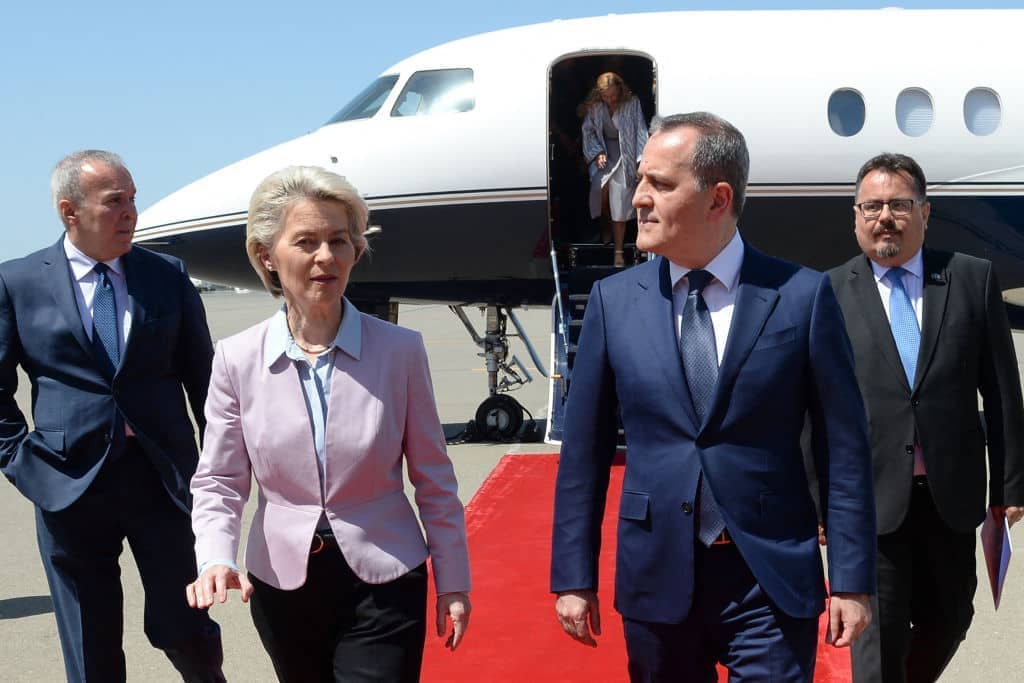My enemy’s enemy is my friend. This ancient proverb partly describes the EU’s fast developing relationship with Muslim Azerbaijan, a Turkic country whose forever enemy is neighbouring Christian Armenia which is militarily supported by Russia. And natural gas is the crux of this unnatural alignment.
On 18 July the EU gleefully announced that by 2027 the Azerbaijan government had agreed to increase its gas supply from its Caspian Sea fields to Europe from 8 bcm (billion cubic metres) to 20 bcm per annum. Although this would still only represent 12 per cent of Europe’s gas imports last year, President of the EU Commission, Ursula von der Leyen, nevertheless described Azerbaijan as ‘a key partner in our efforts to move away from Russian fossil fuels’.
Given that Azerbaijan is currently experiencing power blackouts itself, it can only be assumed that the EU is preparing to chip in significant investment into the development of Baku’s Caspian Sea gas fields. This seems particularly necessary since BP, Chevron and ExxonMobil, in the aftermath of the Second ‘44-day’ Nagorno-Karabakh war between Azerbaijan and Armenia in September 2020, have either divested or are considering divesting themselves of assets in the region. Thus, as Maximilian Hess, a Central Asia analyst at the Foreign Policy Research Institute has asserted, western government ‘energy investment is central to Azerbaijan’s efforts to bolster the regime and retain independence from Moscow’
The EU has shown, when needs must, moral objections to a rotten totalitarian regime fly out of the window
On the face of it, Europe should be hostile to the dictatorial government of President Ilham Aliyev. His father, Heydar Aliyev, a former high ranking Soviet KGB officer, seized power in a coup against its elected president in 1993. In a subsequent election he won a patently fraudulent 98 per cent of the vote. Since then, Azerbaijan has developed into a crony-capitalist state par excellence.
The Aliyev’s are believed to hold stakes in almost every important business in the country. Despite a presidential salary of around $230,000 Aliyev and his family have amassed a collective fortune estimated at about $900 million. The leaked release of the Panama Papers showed that they own significant property assets in Europe. Aliyev’s three children were registered as shareholders in 44 companies in the British Virgin Islands.
The tentacles of this empire have spread to trusts in the Isle of Man. In 2018, through a sale to the Crown Agents – the Queen’s property empire – the Aliyev’s flipped a London property bought a decade earlier to bank a $42 million profit. Transparency International’s Corruption Perception Index places Azerbaijan in 128 out of 180 countries, only a few places about the pariah state of Myanmar.
Despite Azerbaijan’s dismal track record of human rights and particularly its suppression of the rights of Christian Armenians, the EU has remained determinedly neutral about Nagorno-Karabakh. The Armenian enclave, self-styled as the Republic of Artsakh, by international law belongs to Azerbaijan, but broke away from Azerbaijan after the collapse of the Soviet Union. After the fiercely fought First Nagorno-Karabakh war, which displaced more than a million people, an uneasy truce was negotiated in 1994.
Throughout this long running conflict, it was Russia not Europe that played peacemaker, albeit with an Armenian tilt. By the end of this second war Azerbaijan, heavily supplied with Turkish arms, had gobbled up 20 per cent of Nagorno-Karabakh. In the last week border fighting has resumed and an estimated 100 combatants have been killed. Both sides blame each other for the conflagration.
It seems likely that the drawing of Russian peacekeeping soldiers to Ukraine from the strategically essential Lachin Corridor that links Armenia with the Nagorno-Karabakh has prompted a resumption of hostilities. Russia’s peacekeeping mandate lasts until 2025. But Europe may need to act sooner. The southern gas pipeline passes through the strategically vulnerable Azerbaijani Ganja Gap which lies just north of Nagorno-Karabakh, and then on to Georgia, Turkey, Bulgaria and the rest of Europe.
The EU cannot afford disruption to this precious source of gas. But there is a delicate balancing act to be played. The EU’s energy needs require Azerbaijan to be supported but if the Aliyevs are too successful in their push to take control of Nagorno-Karabahk, it risks the return of very pro-Russian opposition leaders in Armenia. Russia of course would very much like to disrupt the southern pipeline to continue the energy squeeze on Europe.
The EU will have to navigate its way through this spaghetti soup of Caucasian geopolitical entanglement. But support for the stonkingly corrupt Aliyevs in Azerabaijan will be the essential bedrock of this policy. The EU has shown, when needs must, moral objections to a rotten totalitarian regime fly out of the window.
As with Qatar, Saudi Arabia and Russia (at least before the invasion of Ukraine), the EU, when it comes to energy security, is prepared to do deals with any totalitarian state however regressive. Similarly tainted countries such as Myanmar are in a different category; their resources are not essential to Europe. Moral-posturing EU politicians and commentators can therefore indulge in free hits on the current military regime there and Aung Sang Suu Kyi’s government that preceded it.
Its hypocrisy yes, but it is also realpolitik. And it is realpolitik that makes the world go round when governments pursue their fiduciary duty– the interests of the people they represent. Nothing wrong with that. In geopolitics problems generally arise when moral concerns dictate a country’s foreign policy. Of course, Europe would not need to be pally-pally with regimes as odious as Azerbaijan if it decided to ‘follow the science’ by starting to frack its vast reserves of shale gas; by 2027 it could be half-way along the path to gas self-sufficiency… but that is another story.






Comments